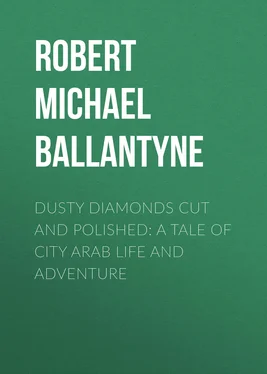Robert Michael Ballantyne - Dusty Diamonds Cut and Polished - A Tale of City Arab Life and Adventure
Здесь есть возможность читать онлайн «Robert Michael Ballantyne - Dusty Diamonds Cut and Polished - A Tale of City Arab Life and Adventure» — ознакомительный отрывок электронной книги совершенно бесплатно, а после прочтения отрывка купить полную версию. В некоторых случаях можно слушать аудио, скачать через торрент в формате fb2 и присутствует краткое содержание. Жанр: Детские приключения, literature_19, foreign_antique, foreign_prose, foreign_children, на английском языке. Описание произведения, (предисловие) а так же отзывы посетителей доступны на портале библиотеки ЛибКат.
- Название:Dusty Diamonds Cut and Polished: A Tale of City Arab Life and Adventure
- Автор:
- Жанр:
- Год:неизвестен
- ISBN:нет данных
- Рейтинг книги:5 / 5. Голосов: 1
-
Избранное:Добавить в избранное
- Отзывы:
-
Ваша оценка:
- 100
- 1
- 2
- 3
- 4
- 5
Dusty Diamonds Cut and Polished: A Tale of City Arab Life and Adventure: краткое содержание, описание и аннотация
Предлагаем к чтению аннотацию, описание, краткое содержание или предисловие (зависит от того, что написал сам автор книги «Dusty Diamonds Cut and Polished: A Tale of City Arab Life and Adventure»). Если вы не нашли необходимую информацию о книге — напишите в комментариях, мы постараемся отыскать её.
Dusty Diamonds Cut and Polished: A Tale of City Arab Life and Adventure — читать онлайн ознакомительный отрывок
Ниже представлен текст книги, разбитый по страницам. Система сохранения места последней прочитанной страницы, позволяет с удобством читать онлайн бесплатно книгу «Dusty Diamonds Cut and Polished: A Tale of City Arab Life and Adventure», без необходимости каждый раз заново искать на чём Вы остановились. Поставьте закладку, и сможете в любой момент перейти на страницу, на которой закончили чтение.
Интервал:
Закладка:
“Goodness me! it moves!” exclaimed Mrs Loper.
“Live poultry!” thought the black sheep, and visions of police cells and penal servitude floated before his depraved mental vision.
“Yes, Mrs Loper, it moves. It is alive—though not very much alive, I fear. My dear, I’ve found—found a baby—picked it up in the street. Not a soul there but me. Would have perished or been trodden on if I had not taken it up. See here!”
He untied the dirty bundle as he spoke, and uncovered the round little pinched face with the great solemn eyes, which gazed, still wonderingly, at the assembled company.
It is due to the assembled company to add that it returned the gaze with compound interest.
Chapter Five.
Treats still further of Riches, Poverty, Babies, and Police
When Mr and Mrs Twitter had dismissed the few friends that night, they sat down at their own fireside, with no one near them but the little foundling, which lay in the youngest Twitter’s disused cradle, gazing at them with its usual solemnity, for it did not seem to require sleep. They opened up their minds to each other thus:—
“Now, Samuel,” said Mrs Twitter, “the question is, what are you going to do with it?”
“Well, Mariar,” returned her spouse, with an assumption of profound gravity, “I suppose we must send it to the workhouse.”
“You know quite well, Sam, that you don’t mean that,” said Mrs Twitter, “the dear little forsaken mite! Just look at its solemn eyes. It has been clearly cast upon us, Sam, and it seems to me that we are bound to look after it.”
“What! with six of our own, Mariar?”
“Yes, Sam. Isn’t there a song which says something about luck in odd numbers?”
“And with only 500 pounds a year?” objected Mr Twitter.
“ Only five hundred. How can you speak so? We are rich with five hundred. Can we not educate our little ones?”
“Yes, my dear.”
“And entertain our friends?”
“Yes, my love,—with crumpets and tea.”
“Don’t forget muffins and bloater paste, and German sausage and occasional legs of mutton, you ungrateful man!”
“I don’t forget ’em, Mariar. My recollection of ’em is powerful; I may even say vivid.”
“Well,” continued the lady, “haven’t you been able to lend small sums on several occasions to friends—”
“Yes, my dear,—and they are still loans,” murmured the husband.
“And don’t we give a little—I sometimes think too little—regularly to the poor, and to the church, and haven’t we got a nest-egg laid by in the Post-office savings-bank?”
“All true, Mariar, and all your doing. But for your thrifty ways, and economical tendencies, and rare financial abilities, I should have been bankrupt long ere now.”
Mr Twitter was nothing more than just in this statement of his wife’s character. She was one of those happily constituted women who make the best and the most of everything, and who, while by no means turning her eyes away from the dark sides of things, nevertheless gave people the impression that she saw only their bright sides. Her economy would have degenerated into nearness if it had not been commensurate with her liberality, for while, on the one hand, she was ever anxious, almost eager, to give to the needy and suffering every penny that she could spare, she was, on the other hand, strictly economical in trifles. Indeed Mrs Twitter’s vocabulary did not contain the word trifle. One of her favourite texts of Scripture, which was always in her mind, and which she had illuminated in gold and hung on her bedroom walls with many other words of God, was, “Gather up the fragments, that nothing be lost.” Acting on this principle with all her heart, she gathered up the fragments of time, so that she had always a good deal of that commodity to spare, and was never in a hurry. She gathered up bits of twine and made neat little rings of them, which she deposited in a basket—a pretty large basket—which in time became such a repository of wealth in that respect that the six Twitters never failed to find the exact size and quality of cordage wanted by them—and, indeed, even after the eldest, Sammy, came to the years of discretion, if he had suddenly required a cable suited to restrain a first-rate iron-clad, his mind would, in the first blush of the thing, have reverted to mother’s basket! If friends wrote short notes to Mrs Twitter—which they often did, for the sympathetic find plenty of correspondents—the blank leaves were always torn off and consigned to a scrap-paper box, and the pile grew big enough at last to have set up a small stationer in business. And so with everything that came under her influence at home or abroad. She emphatically did what she could to prevent waste, and became a living fulfilment of the well-known proverb, for as she wasted not she wanted not.
But to return from this digression—
“Well, then,” said Mrs Twitter, “don’t go and find fault, Samuel,” (she used the name in full when anxious to be impressive), “with what Providence has given us, by putting the word ‘only’ to it, for we are rich with five hundred a year.”
Mr Twitter freely admitted that he was wrong, and said he would be more careful in future of the use to which he put the word “only.”
“But,” said he, “we haven’t a hole or corner in the house to put the poor thing in. To be sure, there’s the coal-cellar and the scuttle might be rigged up as a cradle, but—”
He paused, and looked at his wife. The deceiver did not mean all this to be taken as a real objection. He was himself anxious to retain the infant, and only made this show of opposition to enlist Maria more certainly on his side.
“Not a corner!” she exclaimed, “why, is there not the whole parlour? Do you suppose that a baby requires a four-post bed, and a wash-hand-stand, and a five-foot mirror? Couldn’t we lift the poor darling in and out in half a minute? Besides, there is our own room. I feel as if there was an uncomfortable want of some sort ever since our baby was transplanted to the nursery. So we will establish the old bassinet and put the mite there.”
“And what shall we call it, Maria?”
“Call it—why, call it—call it—Mite—no name could be more appropriate.”
“But, my love, Mite, if a name at all, is a man’s—that is, it sounds like a masculine name.”
“Call it Mita, then.”
And so it was named, and thus that poor little waif came to be adopted by that “rich” family.
It seems to be our mission, at this time, to introduce our readers to various homes—the homes of England, so to speak! But let not our readers become impatient, while we lead the way to one more home, and open the door with our secret latch-key.
This home is in some respects peculiar. It is not a poor one, for it is comfortable and clean. Neither is it a rich one, for there are few ornaments, and no luxuries about it. Over the fire stoops a comely young woman, as well as one can judge, at least, from the rather faint light that enters through a small window facing a brick wall. The wall is only five feet from the window, and some previous occupant of the rooms had painted on it a rough landscape, with three very green trees and a very blue lake, and a swan in the middle thereof, sitting on an inverted swan which was meant to be his reflection, but somehow seemed rather more real than himself. The picture is better, perhaps, than the bricks were, yet it is not enlivening. The only other objects in the room worth mentioning are, a particularly small book-shelf in a corner; a cuckoo-clock on the mantel-shelf, an engraved portrait of Queen Victoria on the wall opposite in a gilt frame, and a portrait of Sir Robert Peel in a frame of rosewood beside it.
Читать дальшеИнтервал:
Закладка:
Похожие книги на «Dusty Diamonds Cut and Polished: A Tale of City Arab Life and Adventure»
Представляем Вашему вниманию похожие книги на «Dusty Diamonds Cut and Polished: A Tale of City Arab Life and Adventure» списком для выбора. Мы отобрали схожую по названию и смыслу литературу в надежде предоставить читателям больше вариантов отыскать новые, интересные, ещё непрочитанные произведения.
Обсуждение, отзывы о книге «Dusty Diamonds Cut and Polished: A Tale of City Arab Life and Adventure» и просто собственные мнения читателей. Оставьте ваши комментарии, напишите, что Вы думаете о произведении, его смысле или главных героях. Укажите что конкретно понравилось, а что нет, и почему Вы так считаете.












